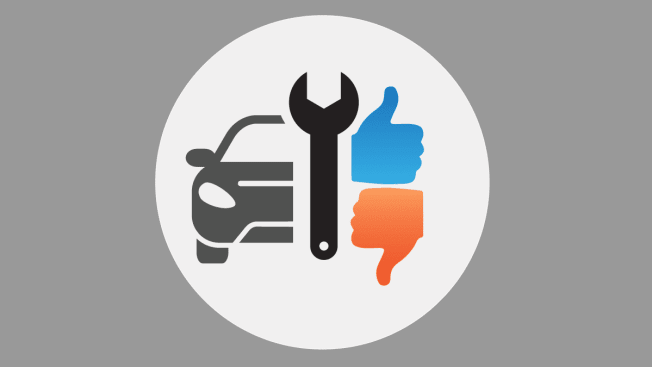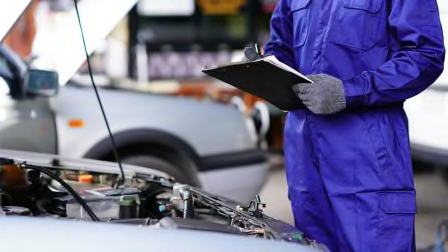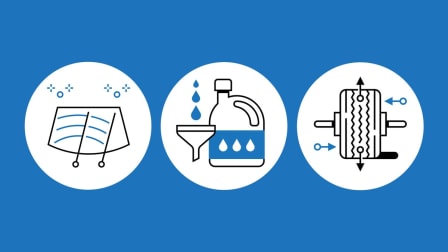Car Owners Favor Independent Repair Shops
Dealership service departments receive low ratings due to their high prices, according to CR's exclusive member survey

When it comes to automotive service facilities, Consumer Reports members prefer independent shops—and, in some cases, chains—over dealerships, according to our annual survey.
The survey results show the experiences of 10,973 Consumer Reports members with 11,670 repairs at 36 auto repair chains, independent shops analyzed as a group, and dealerships. (More on our methodology below.)
- Repair Shops: Dealerships Independent Shops Chains Survey Methodology
This year, we focused on members’ experiences when their cars needed repairs that were paid for out of pocket, as opposed to recall repairs, which are free, and routine maintenance. It’s important to understand the difference between repairs and maintenance. Repairs are needed when unexpected malfunctions occur due to worn or broken parts, or mechanical and electronic defects. Regular maintenance covers routine procedures like oil, fluid, and filter changes; windshield wiper blade replacements, and tire rotations.
CR’s survey reveals a range of experiences depending on the service and where the work was performed.
“A great way to find a shop you can trust for repairs is by getting routine maintenance done at the same place consistently, whether at a dealership or an independent shop,” Ibbotson, says. “That way you can establish a relationship with the shop’s staff, and its mechanics can get to know your car and keep an eye on developing problems before they become bigger, more expensive issues.” He advises that chains that specialize in quick oil changes can be convenient, but because of their limited capabilities, dealerships or independent shops are better for most repairs.
The survey asked consumers to rate repair shops based on 12 attributes: honesty; price; the quality of the work; the amount of time it took to complete repairs; communication about the repair; whether or not the problem was fixed the first time; the accuracy of the initial cost estimate; the shop’s willingness to negotiate on price; the presence of free perks with service (such as car washes, loaner cars, and shuttle service); the presence of discounts; the proximity or convenience of the shop’s location; and the presence of guarantees or warranties for work done.
Here are some of the key takeaways from our car repair survey:
The older the car, the less likely its owner was to take it to a dealership for repairs. For example, about 80 percent of drivers with a car from model year 2023 went to the dealership, while only 18 percent took a model-year 2000 car to the dealership.
Dealerships
The dealership is the best place (the only one, usually) to go for factory warranty and recall repairs or “service campaigns’’ in which the manufacturer will fix a defect free of charge. But dealer service departments are also a good option when your car has a problem that requires special tools, diagnostic equipment, or expertise you’re not likely to find anywhere else. Labor rates tend to be higher, but technicians are factory-trained and routinely work on cars similar to yours. Parts are more expensive, too, but they’re the factory-original ones that are most often best for your car.
Among the problems you might want a dealership to look at are infotainment systems glitches, software updates (assuming your car doesn’t get over-the-air updates, in which case you don’t have to go anywhere), or repairing and calibrating safety and driver aid sensors and parts that are specific to the vehicle. (These sensors are often located in the bumpers and need to be recalibrated with special equipment so that the car’s computer knows where the car is in relation to other cars and objects for systems such as automatic emergency braking and adaptive cruise control.)
“If you’re someone who doesn’t keep a car until the end of its useful life, a dealership service record certainly won’t hurt the resale value,” says Ibbotson. “That’s because people take comfort in knowing that the car has been serviced by technicians trained specifically for that type of vehicle.”
According to CR’s survey results, the age of the car wasn’t the only factor affecting someone’s likelihood of going to the dealer for service. Brand mattered, too. The most likely to visit the dealership for service were the owners of a Tesla (89 percent), Cadillac (61 percent), Audi (54 percent), Ram (54 percent), and Subaru (52 percent). The least likely to go to the dealership for repairs were the owners of a Chevrolet (43 percent), Hyundai (40 percent), Jeep (39 percent), Chrysler (31 percent), and Dodge (29 percent).
Independent Shops
For most drivers, it makes the most sense to take a car that’s no longer under warranty to an independent repair facility. That’s because independent repair shops offer service that’s just as good as dealership service departments’ but at a lower price. Other than the esoteric repairs that can only be handled by a dealership service department or specialist, most repairs—large and small—can be taken on by an independent repair shop. Independents do everything from oil changes to engine replacements, and, according to Ibbotson, often have some of the best-trained techs to be found anywhere. Some shops specialize in certain brands or regions of manufacture, such as European and Japanese cars.
Labor rates at independent shops tend to be lower than at dealerships, and many shops use aftermarket parts, which usually cost less than factory parts. That said, you can still ask for factory parts at an independent shop, giving you a winning combination of good service for less using the best quality parts.
“It’s no secret that service departments are a big revenue source for dealerships,” says Ibbotson. “It’s also common knowledge that you can save a significant amount of money by getting your car serviced by experienced technicians (many of them former dealership techs) at an independent repair shop instead.”
Ibbotson says establishing a relationship with an independent repair shop with routine maintenance items gives the technicians a chance to get to know your car and its maintenance history. That helps minimize the surprise element of some repairs, giving you time to save for the expense. Best of all, according to CR’s survey, independent shops are the most likely to bargain over price, so you may be able to get a discount.
Chains
Like independent shops, chain repair facilities like Goodyear, Firestone, and Mavis are also capable of performing most maintenance and repair operations. Ibbotson says some chains tend to employ less-experienced technicians, but that isn’t always the case, and there’s usually an experienced tech or two in the shop to guide the less experienced ones.
Even so, a handful of chains sit at the top of CR’s repair shop ratings. One thing survey respondents really liked about chains, across the board, was their convenience and location—an important consideration for anyone who has to pile car repairs on top of an already busy schedule.
Ibbotson says chain shops can be great places to save money on tire installation, wheel alignments, and exhaust work. Many of them specialize in that type of work, and some may offer discounts or incentives to come back for other repair and maintenance items.
“Chains that specialize in tires are a great place to get a deal on tires, but they usually don’t focus on the overall condition of the car,” says Ibbotson. “If they find rusty or worn brake, suspension, or steering parts, they may refer you to an independent shop because they don’t want to spend time on those types of repairs.”
Survey Methodology
In our 2023 Summer Survey, Consumer Reports asked members to report on their experiences with auto repair shops. A total of 16,914 Consumer Reports members reported repairs they had sought for up to two vehicles; in all we collected data on 19,934 repairs. For the purposes of our ratings, we randomly selected one repair per repair shop per member so that each member was not reporting on the same repair shop more than once. We also focused only on repairs that were paid for out of pocket.
Our ratings sample includes 10,973 Consumer Reports members reporting on their experiences with 11,670 repairs at 36 auto repair chains, independent shops (analyzed as a group), and dealerships. To be included in our ratings, members must have sought to repair their vehicle(s) in the 24 months preceding the survey. We asked members not to report on repairs related to general maintenance, tire damage or replacement, collision damage, and cosmetic or design issues. For the purposes of these ratings and analysis, we included only repairs that were paid for out of pocket and excluded repairs that were covered by a warranty or that were part of a recall.
@consumerreports Stay away from touch car washes 🫣. See car ratings and reviews through the link in our bio. #carsoftiktok #cartok #carcommunity #5thingsiwouldneverdo
♬ original sound - Consumer Reports
Car Repair Shops
See CR’s exclusive full ratings.





















